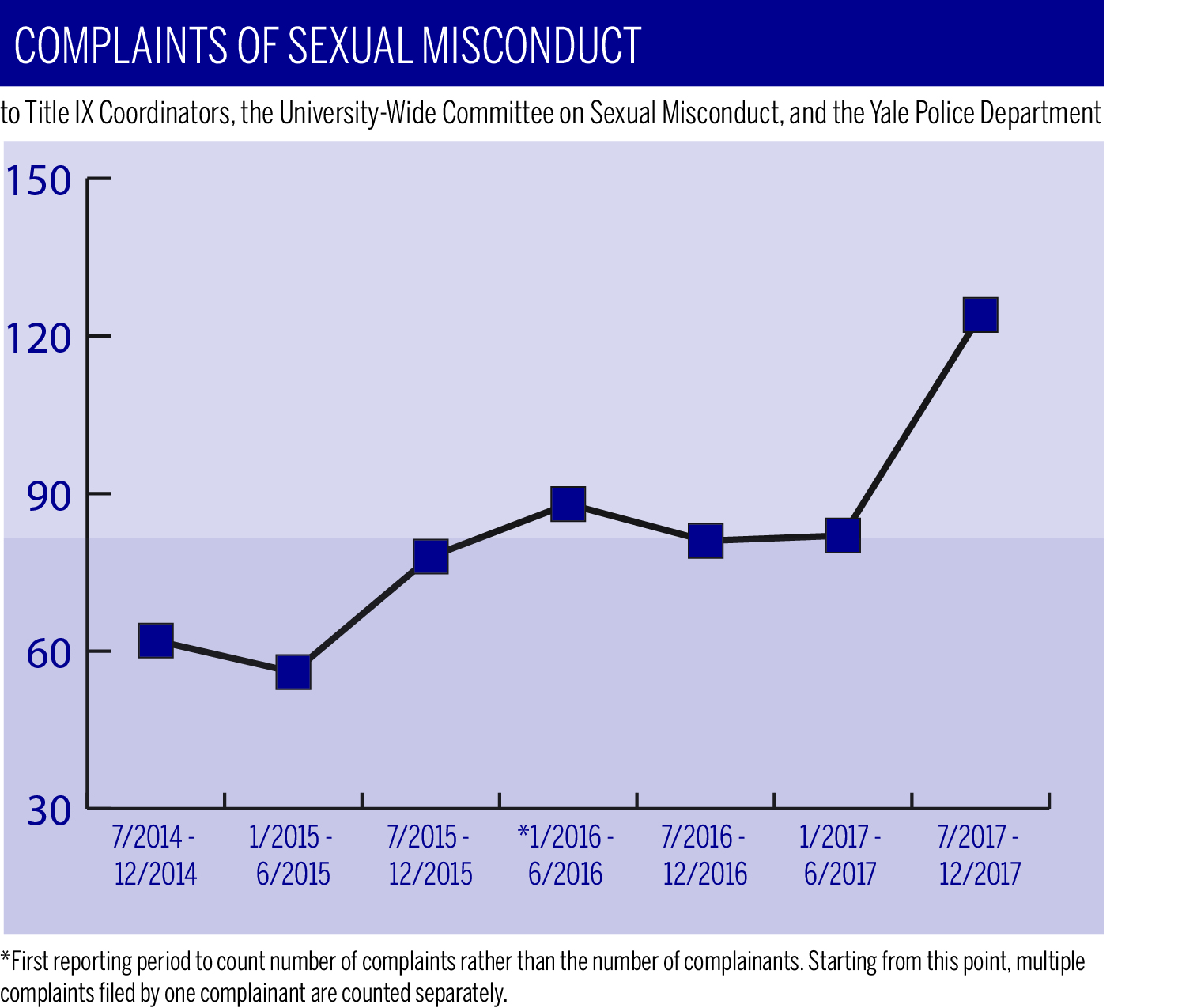
Emily Lin
Yale received 124 complaints of sexual misconduct — an all-time high since the University began publishing records of its complaints in 2011 — between July 1 and Dec. 31 of last year, according to the most recent semiannual report on the subject.
The number of complaints documented in the report, which was released in an email by University Title IX Coordinator and Deputy Provost Stephanie Spangler on Wednesday, far surpasses the previous high of 88 complaints, registered between Jan. 1, 2016, and June 30, 2016. The 12 previous reports have documented between 43 and 88 complaints.
In the introduction to the most recent report, Spangler said that, although it is impossible to know with certainty, the uptick in the number of complaints may reflect “heightened national attention to the issue of sexual misconduct.”
“The number of complaints brought forward during this reporting period is notably large relative to previous reporting periods,” Spangler wrote. “Indeed, during the past few months in particular, we have heard from a number of former members of the Yale community about behaviors they experienced in the past while at Yale, and, in these cases, we have made our support resources and our complaint procedures, where relevant, available to them. At the same time we have also seen a relative increase in complaints brought forward by current members of our community.”
The University hopes the overall increase in the number of complaints reflects not only the greater national attention on the issue of sexual misconduct but also a “growing awareness of and comfort with our procedures and resources,” Spangler added.
Among the 124 complaints documented in the report, two were formal complaints ultimately resolved by the University-Wide Committee on Sexual Misconduct — one of which was newly filed between July 1 and Dec. 31, while the other was updated during that timeframe. The two complainants, both Yale College students, alleged that they were groped by the same respondent, who was suspended for two semesters after the University-Wide Committee found sufficient evidence to support the allegations. The respondent — who has been identified as Daniel Tenreiro-Braschi — has since sued the University, invoking Title IX to allege gender discrimination.
In one of the 122 other complaints — which were handled by Title IX coordinators and the Yale Police Department — documented in the report, a Yale College student reported that members of a student group required undergraduate students to engage in sexual activities “as a rite of initiation.” An administrator subsequently counseled the organization’s leadership, according to the report.
Later this spring, the University will launch a foundational online training program for faculty, students and staff, the report says. Additionally, the Title IX office will continue to develop bystander intervention workshops for graduate and professional students, and Yale will conduct the Association of American Universities’ sexual climate survey in spring 2019.
Students interviewed by the News agreed with Spangler that the increase in the number of complaints may reflect the ongoing national reckoning over sexual misconduct.
“On the more broad national level, we had the #MeToo movement and generally sexual harassment and sexual assault have been covered more broadly in the media, and I think this is a reflection of that, and I hope that it leads to real progress,” said Lea Sparkman ’20.
According to Abby Leonard ’21, co-president of Unite Against Sexual Assault at Yale, studies have shown that increases in reporting rates are more indicative of better reporting systems than of increasing rates of sexual assault.
Still, the number of people assaulted on Yale’s campus and college campuses nationwide is “horrifying,” Leonard said. She added that Yale should implement an anonymous online reporting system in order to encourage more survivors to report.
“This increase may seem alarming to people when they first hear about it, but it’s actually a good thing that more survivors are coming forward,” said Helen Price, co-founder of Unite Against Sexual Assault at Yale. “I think some survivors may have been concerned about Betsy DeVos’s changes to the ways schools handle sexual assault, which were quite uncertain last semester, so some survivors thought it may be their last chance to report through the University.”
Last semester, DeVos rescinded the Obama-era “Dear Colleague Letter” that called on universities to institute the low bar of a “preponderance of evidence” standard in sexual misconduct case.
Price added that she expects to see another increase in the reporting of sexual misconduct this semester, given the increased attention on sexual assault at Yale.
Yale’s Sexual Harassment and Assault Response & Education Center is located at the lower level of 55 Lock St.
Britton O’Daly | britton.odaly@yale.edu
Hailey Fuchs | hailey.fuchs@yale.edu








